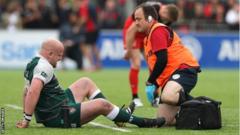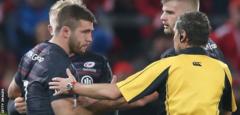| Rugby Union: An Injury Crisis? |
|---|
| Station: BBC Radio 5 live Date: Thursday 12 October 12 Time: 19:30-20:30 BST |
The statistics have been piling up at the start of this rugby season: 10 of the 12 Premiership clubs suffering a combined 82 injuries to first-team players; one of them, Wasps, beginning October with 15 players out injured; Dragons going into this weekend with 24 players on the sick list.
It may turn out to be a freakish blip, a cruel upsurge in a sport where the number of professional players injured has been relatively static over the past eight years. The Rugby Football Union's annual injury audit in the new year should tell us more.
For now, for those on the front line, it is about more than numbers. This is the story from those living through it: the coach missing half his team, the international player who wakes up in pain but keeps coming back for more, the rugby obsessive forced to retire young, the doctor who tries to patch them up and keep them going.
All still cherish the sport. None are complaining. If it sounds like a strange type of love affair, this is how it works. And hurts.
The player who keeps going: 'I'd never say you're 100% fresh'
Tight-head prop Dan Cole has been capped 74 times for England, been on two British and Irish Lions tours and made more than 200 club appearances for Leicester Tigers and Bedford Blues.
He is a man who relishes the brutal forces and challenges of playing in the front row, a stoic who missed most of 2014 with a neck injury that left him with no power in his left arm but has come back to keep playing past his 30th birthday. What follows is neither a grumble nor hyperbole.
"You struggle to get a good night's sleep after a game on a Saturday afternoon because your ear's hanging off or your shoulders hurt. You get to three o'clock on a Sunday and you start feeling worse. Normally Monday is the worst day for stiffness, tiredness, pain," said the 30-year-old.
"What hurts most depends which way you've been lying, but usually you'll have a stiff neck or a stiff shoulder. You're creaky in your lower limbs, but you still get going. You have to get going. Usually by Thursday you're close to 95%. I'd never say you're 100% fresh.
"The pain bonds you as a team. You learn about each other in the tough times, whether that's the physical tough times or the mental ones, the emotional times. From that you get a deeper learning of each other, a deeper trust of each other.
"I do think about what it will be like when I'm 50 or 60. We were laughing in the dressing room today about what our reunion in 30 years' time will look like.
"It's a harder game now than when I started. It's physically tougher. There are more collisions, the skill level is higher, the conditioning is higher.
"To us it's all worth it, because we love what we do. You accept how you're going to be because you've enjoyed what you do. You prefer that to sitting at a desk for 50 years.
"My grandfather worked down a coal mine. The seam collapsed on him and he broke his back. He was left injured by his job and I will possibly have the same consequences. But I enjoy my job a lot more than he enjoyed his, so it's a pay-off.
"The big one you fear is a spinal injury. Everything else in your career, touch wood, whether it's knee ligaments or shoulders, surgery and medicine are so good that they can fix that in six or nine months. Spines, brains, the neural stuff - those are the ones you don't wish on anyone.
"There are times when you get rolled up at the bottom of things, or when you're clearing someone out of a breakdown and maybe your foot gets trapped and you're rolled back, or you're over the ball and you think, 'uh-oh'. There's a moment when you know for a flash second that you could be in trouble.
"Then your foot springs loose, it's over and you dust yourself off and you get on with it. You get two or maybe more a season like that when you think, 'I'm glad I came out of that unharmed'. You check yourself over and then you run off, because there's something else to be done.
"You accept it as part of the game. If you dwell on it, it will affect you for longer, and you'll probably expose yourself more to those sort of things. It's like if you go on an advanced driving course and you're told that if you're skidding out of control and you look at the crash, you're going to go into it, but if you look away from it you'll be ok."
The career cut short: 'It's like a big anvil being dropped on you'
The relentlessly positive Will Fraser won the European Cup and Premiership double with Saracens, and after being called into the England squad as a 23-year-old, appeared set for a long and successful career.
Instead, after a series of injuries - including tearing a tendon off the bone in his shoulder, damaging knee ligaments, a slipped disk, a bleed on the spine - and 10 subsequent operations, he went to his surgeon in April this year to receive his final diagnosis. He does not regret anything that happened to him.
"I had become best mates with all these consultants who were experts in different areas of the anatomy. There was a pub round the corner from the surgeon's office, so me and my physio had a pint to discuss various outcomes," said the 27-year-old.
"We went in to the surgeon's, and he said what he said. It's the realisation, but at the same time you're fighting every urge to accept it. Even though in the back of my mind I probably knew, I was still trying to fight it.
"It's not really until you're given that black and white news by someone else, because if it was up to me I'd still be giving it a go. To have a surgeon, a top-of-his-game surgeon, say to you, 'This isn't going to get better, it's time to call it a day,' is like a big anvil being dropped on top of you.
"We went back to the pub, had a few more pints, and I didn't really say very much. It was just my physio being a good bloke and telling me there were better things coming in my life. Then I went home and basically broke down in front of my missus.
"No-one else among the Saracens players really knew the gravity of where we were. I had purposely tried to keep it away from the lads as much as possible, because we're a very tight group.
"I even kept it away from my super-close friends like Jamie George, Owen Farrell, Jackson Wray and George Kruis, because I didn't want them to worry. These are guys I've grown up with, who I've seen every day since I was 14.
"For a week or two it was all very surreal. I was still in and around the club for a couple of weeks, having to keep it secret from my team-mates. When I finally told the team I was genuinely worried I wouldn't be able to get any words out. I was blubbering away. Waterfalls streaming down my face.
"I just wanted to thank them. People have always asked me, with the injuries, 'how are you able to come into training with a smile on your face when you're not playing'? And I said to the boys, 'the reason I was able to do that is because I was coming in to see you guys'. I'm doing something I love, with people that I love.
"I pop down to the training ground once a week to get my fix of seeing the lads and getting some banter thrown my way for my work bag. And it's like I've never left, which is obviously brilliant, and exactly how you want it to be. But equally they then go out and train, and I'm inside sending some emails, and it hits home every time that you're not doing it."




Không có nhận xét nào:
Đăng nhận xét